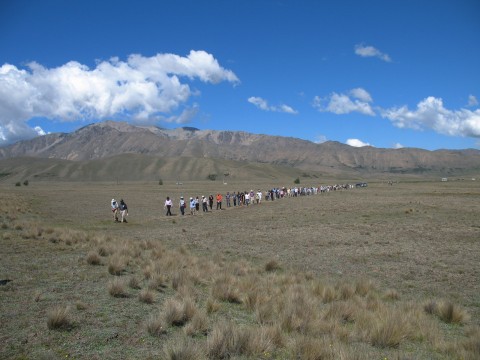High country summit
Blogger: Forest & Bird Advocate, Nic Vallance
Last weekend saw more than 200 people head for the township of Twizel to engage in two days of discussions around the future of the Mackenzie Basin. Despite the last-minute boycott by Federated Farmers, it was a positive and constructive meeting that involved a large number of people representing a wide range of views. I heard positive feedback from many attendees.
On Friday 26th November, on a day that saw attendees get a first hand appreciation of the Mackenzie’s hot dry climate, we all piled into buses and visited a variety of sites in the basin, ranging from the site of a proposed site for a cow cubicle indoor farming operation to the canals where Meridian spoke on the hydro electricity in the region.
We finished at the Tekapo Scientific Reserve – a protected pest-controlled area that has lain ungrazed for seventeen years. What we learned there was that recovery in the extreme climate of heat, dry and cold, can take a really long time for the myriad tiny plants and animals found there. The tussock was certainly starting to return, but as the old guys on the Mainland Cheese ads say “Good things take time…”
Saturday involved a huge range of speakers at the Twizel events centre, where more than 220 people crammed into the lecture theatre to hear what was being said.
The morning’s programme involved speakers from the whole range of interests and values in the Mackenzie, and included a local iwi perspective from David Higgins (Moeraki Runanga), soil information from Dr Les Molloy, ecological values of the basin from Dr Susan Walker (Landcare Research), landscape values by Simon Swatfield (Lincoln University) and freshwater values from Ned Norton (NIWA).
The following section covered user values in the Mackenzie and was represented by MAF, the Tourism Industry Association, Meridian, Richard Peacocke (Southdown Holdings) as well as Hugh Logan who discussed the conservation economy in the area.
After lunch Dr Nick Smith spoke, and while I was unable to stay for the afternoon session, my understanding is that Dr Smith’s comments centred around the need for local involvement in charting a way forward for the Mackenzie Basin, and that a right to farm did not give a right to pollute. He seemed generally supportive of a collaborative process for the Mackenzie, which is fantastic.
The remainder of the afternoon involved speakers on planning issues. Forest & Bird South Island Manager, Chris Todd spoke about F&B’s concerns, particularly with regard to tenure review. After that there was an opportunity for a range of locals to air their concerns. A panel discussion rounded off the weekend.
The fact that more than 200 people (of whom around half were locals) came together to discuss their issues and concerns around the Mackenzie Basin was an excellent indication that people are willing to engage on the values and threats that face the Mackenzie. The event was well-organised, respectful, representative of all of the parties who have a stake in the basin’s future, and a good start for us all.

